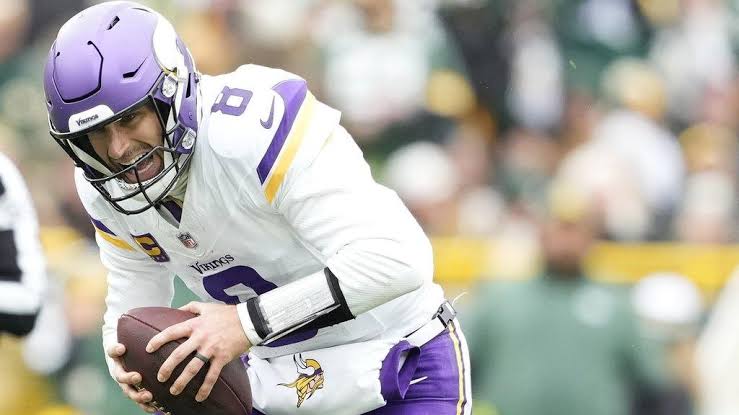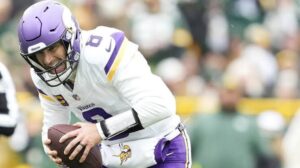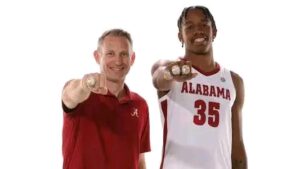
Kirk Cousins Sidelined with Achilles Injury: How the Minnesota Vikings Plan to Adjust Without Their Star Quarterback for the Rest of the Season

The Minnesota Vikings’ playoff aspirations were dealt a significant blow this week as star quarterback Kirk Cousins was confirmed to have suffered a torn Achilles tendon during their Week 8 win against the Green Bay Packers. The injury, which occurred late in the game, has left Cousins out for the remainder of the season, forcing the Vikings to make crucial adjustments both offensively and strategically as they aim to stay competitive in the NFC North.
The Fallout from Cousins’ Injury
Kirk Cousins, who has been the cornerstone of the Vikings’ offense since 2018, was having another strong season. With over 2,000 passing yards, 17 touchdowns, and a solid quarterback rating, Cousins had led the team to a 5-3 record before the injury. His leadership and consistency in the pocket have been key to the Vikings’ success, particularly after the departure of former offensive coordinator Kevin Stefanski and the transition to head coach Kevin O’Connell’s system.
However, the Achilles injury has left the Vikings in a precarious position. Losing Cousins means they are without one of the most durable and reliable quarterbacks in the league, who has rarely missed games throughout his career. In a year when the NFC North is wide open, Minnesota’s playoff hopes now hinge on how quickly they can adapt to life without their Pro Bowl signal-caller.
The Vikings’ Backup Plan: Jaren Hall and the Quarterback Carousel
With Cousins now on injured reserve, the Vikings have turned to rookie quarterback Jaren Hall, a fifth-round pick out of BYU, to take over as the starter. Hall, who has impressed in limited action during the preseason, is expected to be given the first opportunity to lead the offense. Although Hall lacks the experience of Cousins, he brings mobility and a strong arm, attributes that could open up a new dimension for the Vikings’ offense.
Minnesota’s coaching staff is likely to adjust the playbook to suit Hall’s strengths, focusing more on short-to-intermediate passing and perhaps increasing the use of read-option plays to take advantage of his athleticism. However, Hall’s inexperience at the NFL level is a concern, and the Vikings will need to surround him with a solid supporting cast to ensure a smooth transition.
In the event that Hall struggles, the Vikings have a few other options, including veteran backup Nick Mullens, who was acquired from the Las Vegas Raiders in the offseason. Mullens, while not a household name, has starting experience from his time with the San Francisco 49ers and could step in if needed. However, the team is hopeful that Hall can grow into the role and provide a spark for the offense during the second half of the season.
Relying on the Running Game and Defense
With a rookie quarterback at the helm, the Vikings will likely lean more heavily on their running game and defense as they look to remain competitive. The team’s offensive line, which has been a work in progress this season, will need to step up its play to provide Hall with both time to throw and lanes for running back Alexander Mattison, who has had an up-and-down season so far.
Mattison, a former backup to Dalvin Cook, will need to become more of a focal point in the offense, especially as the Vikings will be looking to control the clock and take some pressure off the young quarterback. Minnesota’s running attack will also benefit from tight end T.J. Hockenson, who has been a consistent target for Cousins and will likely remain a key piece in the short-passing game.
On the defensive side of the ball, the Vikings’ defense, which has been solid but not spectacular this season, will need to step up and play more consistently if the team hopes to stay in playoff contention. With an offense that could be more reliant on field position and ball control, the defense must do its part by forcing turnovers and getting off the field on third downs. Minnesota’s pass rush, led by Danielle Hunter, will be crucial in applying pressure on opposing quarterbacks and taking some of the burden off the secondary.
Playoff Push and Future Outlook
With Kirk Cousins now out for the year, the Minnesota Vikings are facing a crossroads. The NFC North remains wide open, but the team will need to show resilience and adaptability to stay in the playoff hunt. Jaren Hall’s development will be key, and the Vikings’ ability to control the clock with the running game and defense will be paramount.
In the long term, the injury to Cousins also raises questions about his future with the team. Cousins is in the final year of his contract, and while he’s been a reliable quarterback for Minnesota, the organization will likely have to evaluate whether to re-sign him or look in a new direction in the offseason.
For now, the Vikings’ focus is on making the best of a difficult situation. If Hall can find his rhythm, and the team can rally around their remaining core players, Minnesota may still have a chance to make a deep playoff run. However, without Cousins, the margin for error is slimmer than ever, and the Vikings will need to adapt quickly to avoid falling out of the postseason race.







